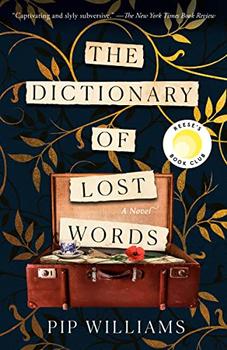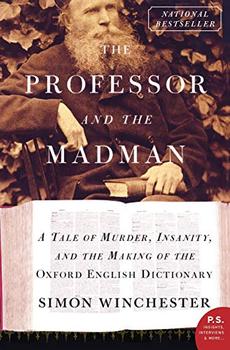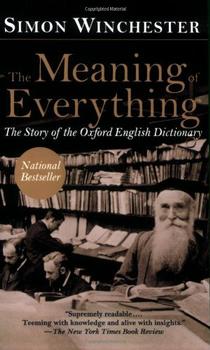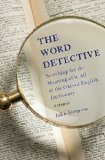Summary | Excerpt | Reading Guide | Reviews | Beyond the Book | Read-Alikes | Genres & Themes | Author Bio

This article relates to The Dictionary of Lost Words
Pip Williams was prompted to write The Dictionary of Lost Words, a novel including historical detail about words omitted from the Oxford English Dictionary, by reading Simon Winchester's 1998 book The Professor and the Madman and wondering where women were in the story of the dictionary. Below is some background on Winchester's book as well as some additional works about dictionaries and words that have been lost from their pages — or just fallen out of regular usage.
 The Professor and the Madman focuses on a niche, though fascinating, incident. For two decades, Professor James Murray, editor of the OED, corresponded with Dr. William Chester Minor, one of thousands of volunteers who sent in quotations for the dictionary's definitions. Minor had been a Civil War surgeon and had lived in Connecticut, yet his frequent letters came postmarked from the village of Crowthorne, just 50 miles from Oxford. Murray invited Minor to visit the dictionary headquarters, but he never accepted. Murray eventually learned Minor was in fact incarcerated in Broadmoor Asylum: a convicted murderer, diagnosed as clinically insane.
The Professor and the Madman focuses on a niche, though fascinating, incident. For two decades, Professor James Murray, editor of the OED, corresponded with Dr. William Chester Minor, one of thousands of volunteers who sent in quotations for the dictionary's definitions. Minor had been a Civil War surgeon and had lived in Connecticut, yet his frequent letters came postmarked from the village of Crowthorne, just 50 miles from Oxford. Murray invited Minor to visit the dictionary headquarters, but he never accepted. Murray eventually learned Minor was in fact incarcerated in Broadmoor Asylum: a convicted murderer, diagnosed as clinically insane.
 Five years later in 2003, Winchester returned with a lively general history of the dictionary, The Meaning of Everything. He begins the book by considering English-language dictionaries previous to the OED, including the American one by Noah Webster. Then, introducing the OED's notable editors and volunteers as well as picking out particularly tricky words, he takes readers behind the scenes of the bustling Scriptorium (where the words for the dictionary were compiled).
Five years later in 2003, Winchester returned with a lively general history of the dictionary, The Meaning of Everything. He begins the book by considering English-language dictionaries previous to the OED, including the American one by Noah Webster. Then, introducing the OED's notable editors and volunteers as well as picking out particularly tricky words, he takes readers behind the scenes of the bustling Scriptorium (where the words for the dictionary were compiled).
The OED was intended as an update of Samuel Johnson's dictionary of 1755, one that held sway for over 170 years. In Defining the World, published in 2006, Henry Hitchings sets the story of this earlier grueling dictionary project, which stretched over more than eight years, in the context of Dr. Johnson's life and explores the impact the book still has today. Structured like a dictionary, Defining the World titles each chapter after a particular word and gives Johnson's definition.
Reading the OED is Ammon Shea's 2009 account of a year spent reading the whole dictionary. That's 21,730 pages of words and definitions across 20 volumes, absorbed in locations from his New York City apartment to the basement of a public library. In 26 chapters based around the letters of the alphabet, he switches between dictionary history, his own project and favorite words. (And yes, he needed reading glasses by the time he was done.)
 In his 2016 book The Word Detective, John Simpson, who edited the OED for nearly 40 years, flags up quirks of the English language and discusses how the dictionary has used technology to stay at the forefront of lexicography.
In his 2016 book The Word Detective, John Simpson, who edited the OED for nearly 40 years, flags up quirks of the English language and discusses how the dictionary has used technology to stay at the forefront of lexicography.
While some words never made it into the OED in the first place, others have been lost from common usage over the years. The Cabinet of Linguistic Curiosities, written by linguist Paul Anthony Jones and published in 2019, zeroes in on 365 obsolete words. From "twarvlement" (a circuitous, long-winded speech) to "crapulence" (a feeling of illness caused by overeating or drinking too much), he proffers a delightful forgotten word for each day of the year.
 The Lost Words by Robert Macfarlane and Jackie Morris, first published in 2017, was inspired by news that many words to do with nature ("acorn," "dandelion," "otter," etc.) had been removed from a recent edition of the Oxford Junior Dictionary and replaced by tech words. Macfarlane put these omitted words back in the spotlight through acrostic poems full of alliteration and wordplay, in a volume illustrated with Morris's superb plant and wildlife paintings.
The Lost Words by Robert Macfarlane and Jackie Morris, first published in 2017, was inspired by news that many words to do with nature ("acorn," "dandelion," "otter," etc.) had been removed from a recent edition of the Oxford Junior Dictionary and replaced by tech words. Macfarlane put these omitted words back in the spotlight through acrostic poems full of alliteration and wordplay, in a volume illustrated with Morris's superb plant and wildlife paintings.
Filed under Reading Lists
![]() This "beyond the book article" relates to The Dictionary of Lost Words. It originally ran in May 2021 and has been updated for the
May 2022 paperback edition.
Go to magazine.
This "beyond the book article" relates to The Dictionary of Lost Words. It originally ran in May 2021 and has been updated for the
May 2022 paperback edition.
Go to magazine.
Your guide toexceptional books
BookBrowse seeks out and recommends the best in contemporary fiction and nonfiction—books that not only engage and entertain but also deepen our understanding of ourselves and the world around us.